
Rainy season gets underway in Cocle
photos and captions by Eric Jackson
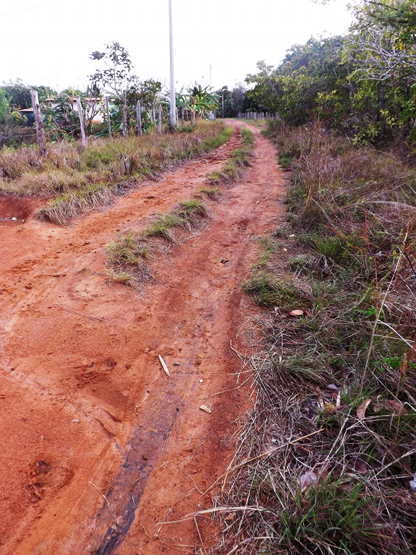
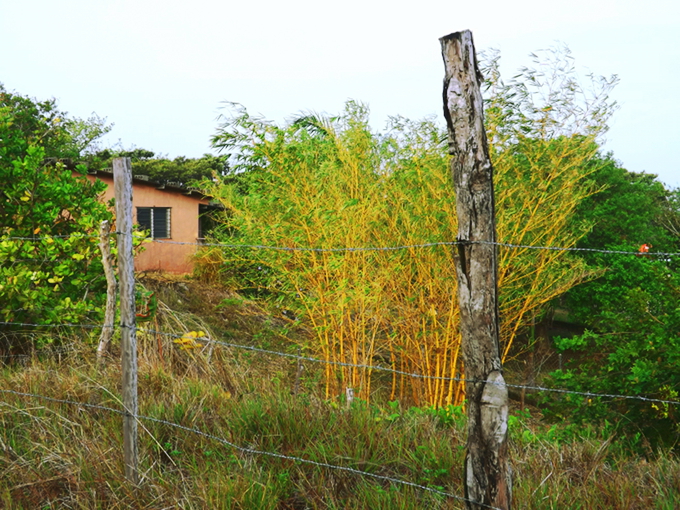
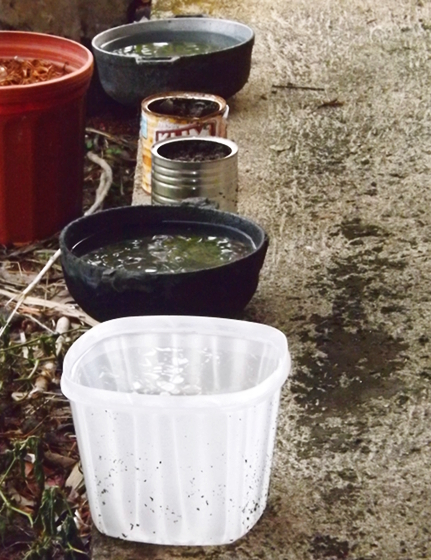

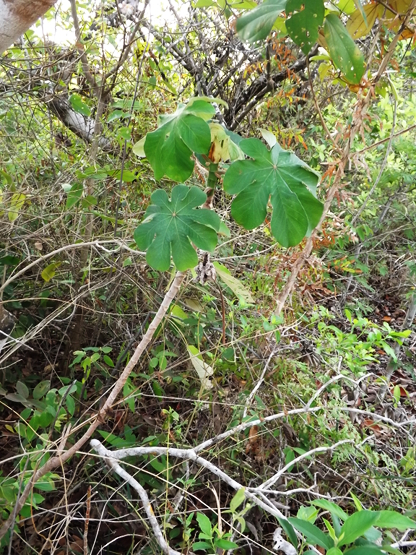
~ ~ ~
These announcements are interactive. Click on them for more information.






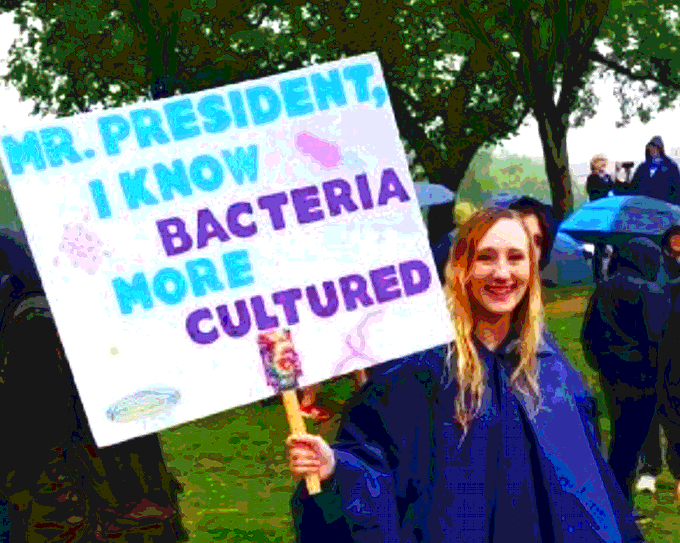
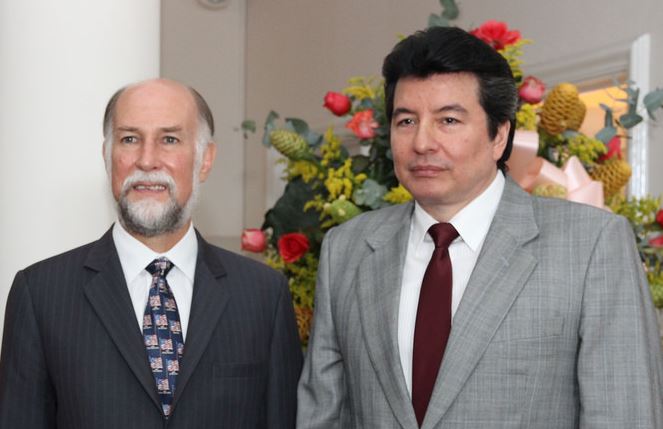
by Eric Jackson
Evidence of a consistent pattern of conduct relevant to serious violations of international humanitarian law under the Statute may be admissible in the interests of justice.
Rules of evidence, international courts for the
former Yugoslavia, Rwanda and Sierra Leone
How does a political caste that embraces all branches of government, which has been caught red-handed at severe and systemic corruption, get away with it? They may not. But the hope of the guilty who want to go unpenalized is that by way of a long-running pantomime act, the impression of exhaustive investigations that lead nowhere will leave the public exhausted and bored with the story. Then the guilty will say that it’s “old news” and that nothing was ever proven, so nothing ever happened.
The problem is that in the course of that repetitive mime show certain patterns become consistent, and certain facts come out in each show, to the point that it’s hard for any serious observer to be fooled. But in corrupted courts everywhere, the dismissal of such patterns and their exclusion as proof is common. Defense counsel and biased judges will dismiss damning facts as just isolated coincidences that don’t really mean anything. “It’s just circumstantial evidence,” is one typical dismissive response, even though many of the strongest criminal cases are based on circumstances rather than the testimony of witnesses to the crime.
A pattern of impunity: the Panamanian people are told that a situation will be thoroughly audited or investigated, but it ends up that the probe is only partial, leaving out times and persons when the only reason to do so is for political convenience.
Did Comptroller General Federico Humbert tell us that he was going to audit all of the Odebrecht contracts? He hasn’t done so with respect to those contracts that bear his own signature of approval. He hasn’t done that with respect to contracts that implicate President Varela or Metro Secretary and Canal Affairs Minister Roberto Roy. He hasn’t gone back into the contracts of the Torrijos administration.
Now, however, we are treated to an audit of five contracts that were awarded by the Martinelli administration on one day, March 29 of 2011, all of them having had bidding on February 11 of that year. Only two of these, the Cinta Costera III and some historical preservation work in Panama City, were Odebrecht contracts. The road from where Tumba Muerto crosses the Transistmica and becomes Avenida Domingo Díaz — or more commonly the road to Tocumen Airport — was a contract with a consortium including Mexico’s ICA and Costa Rica’s Constructora Meco, while the other two were parts of the Via Brazil makeover that was done by Spain’s FCC.
The audit of the five contracts found a consistent pattern of serious overcharges. Consultations with specialists from Panama Technological University, the Chamber of Construction, the Chamber of Commerce and the Panamanian Business Executives Association agreed, compared what was paid to the market value of similar work elsewhere, and pegged the overcharges at between 13.7 percent for the Cinta Costera III and 29.5 percent for one part of the Via Brazil work. All told these five contracts that were made on one day involved more than $318 million in overcharges, some 18.4 percent more than should have been paid.
Are we told that the pattern in the FCC and ICA/Meco contracts followed the pattern shown in worldwide revelations about Odebrecht overcharges? Should we take less notice of that than the downplayed accompanying announcement that Humbert’s audits of Odebrecht are concluded?
Yes, the comptroller general has sent his results to the attorney general, who so far has not been getting many convictions for the five years of in-our-faces corruption by the Martinelli administration. Former President Martinelli, hiding out in his posh Miami condo, has media in which he acquired controlling interests in deals financed by government advertising that will tell you that there are no convictions because there were no crimes.
And what about the more than a dozen criminal cases against the ex-president that are percolating in the high court? There, too, we have a pattern of impunity. Only cases falling outside the specific provisions of the 1904 US-Panamanian extradition treaty have come to the point of arrest warrants being issued. US authorities — who have their own long-running pattern of conduct that allows wealthy Third World thug politicians refuge in the United States if they bring a long of money to stash in US banks — have the perfect excuses to ignore the INTERPOL red notices. Notwithstanding that, Washington always has the option to tell an unsavory former foreign head of state to get out. Speculation is rife about why neither former President Obama nor current President Trump has done this with respect to Martinelli. There is no transparency about such matters so those who talk hardly ever know.
Are any Panamanians fooled? Polls suggest few if any are. In Dichter & Neira’s mid-April poll, 81 percent of Panamanians said that there was little or no government transparency. By a margin of 72 to 18 percent those polled were against the recent Supreme Court decision not to investigate legislators who by all appearances stole from funds meant to be spent on public projects in their circuits. About the only thing that most Panamanians believe in is soccer — and some of the former leading lights of Panama’s FEPAFUT soccer federation are facing trial for corruption.
You never know when some incident might set off a social explosion with far-reaching political implications but those things are rare. And then if you look at the global pattern of Odebrecht bribery, that company paid off not only those in power who have the ability to steer contracts, but also those not even close to power whom might have the power to raise hell about such contracts. Were the usual radical suspects here also paid off? We should not be surprised if they were.
The more usual post-invasion political pattern in Panama is that in two years’ time President Varela’s Panameñista Party loses the presidential palace and many or most legislators lose their jobs. The political parties and various politicians are busy trying to tweak that pattern — there are already billboards up on the Pan-American Highway for various 2019 presidential candidates — but the basic result is likely to be in line with an established pattern.

Two bills in the US Congress that may be of
great importance to Americans living here
Perhaps it’s good news or perhaps it’s bad news that arises amidst the bad news of a US Congress with a largely fanatic majority and a largely anachronistic minority, both of which appear to be mostly ineffective. Probably it’s a mixture of both and probably nothing will change, but US citizens ought to pay attention and perhaps contact the senators and representatives from the states and districts from whence they hail.
The United States is one of very few countries that taxes on the basis of citizenship rather than residency within the country. We could argue back and forth the reason for this and the justice of that scheme, but in any case politicians from both major parties have for years legislated to enforce it against those who would hide money from the Internal Revenue Service in foreign jurisdictions. Or is it about US banks claiming dibs on the accounts of Americans, compelling them to use money laundering centers in states like Nevada instead of in countries like Panama?
One of the enforcement laws is the Foreign Account Tax Compliance Act — FATCA — which in general compels Americans with $10,000 or more in an overseas bank or brokerage account, or invested in a corporation such as the ones in which many upscale Panamanian homes are held, to report this to Uncle Sam. The penalties for failure to comply can be draconian and there are non-disclosure penalties for banks and brokerages with US citizen clients as well. A lot of banks use the FATCA requirements as an excuse to reject all American depositors other than the ultra-rich ones. It’s now hard for a US citizen to get a bank account in many countries, including Panama. Moreover, foreign citizens married to Americans in effect have to reveal their financial affairs to US authorities due to the requirements of FATCA and other US tax laws. These requirements have led thousands of people to renounce US citizenship.
A lot of politicians in Washington have temporized, have been driven by stereotypes or have entirely ignored the issues due to the perception that those who live overseas but vote in their states or districts are too few to affect their own electoral prospects. In the Republican ranks there are those who like any and all tax dodges for the rich and would thus repeal FATCA altogether. On both the Democratic and Republican sides of the aisle there are those relatively few who would switch from citizenship to residency as the basis for income taxation. And then there is the “safe harbor” proposal for which Democrats Abroad has been working for several years. It would make FATCA inapplicable to those who live in the countries where they have accounts. Few of the Americans for whom Panama is a place to hide money actually live here. The US citizens who live here are rarely in Panama for tax reasons.
Thus there is Representative Carolyn Maloney’s exemption from FATCA’s application to accounts in Panama (or any other foreign jurisdiction) held by people who live in Panama (or another country in which they hold accounts). It doesn’t mean that the very rich don’t have to declare their interest and dividend income and doesn’t change the citizenship basis for taxation. It just spares most American citizens living abroad and the banks and brokerages in which they have accounts from a lot of paperwork and some potentially onerous penalties for minor infractions. Maloney is a Democrat from New York with a fair number of foreign-born residents in her district and more than the average number of absentee constituents who cast their ballots for or against her from abroad. She’s one of the few members of Congress who has paid a lot of attention to the six to eight million Americans living outside the USA. Her proposed Overseas Americans Financial Access Act, which follows the 2015 recommendation of the IRS Taxpayer Advocate Service, would make life easier for Americans living in Panama. It’s worth a few calls or emails to Congress to boost this proposal.

Then there is Alabama Representative Mike Rogers and his Border Wall Funding Act of 2017, enrolled as HR 1813. This is an act of financial aggression aimed at all Latin American and Caribbean countries, said to be for the purpose of discouraging “illegal aliens” and raising funds to build Donald Trump’s wall along the Mexican border.
The argument is that people come to the United States from Latin America and the Caribbean to work and send money back to families in their countries of origin. In a lot of countries such remittances are an important source of financial sustenance for many families. Thus Rogers, one of those Republicans who likes to raise taxes, would impose a two percent tax on all money transfers from the United States to anywhere in Latin America or the Caribbean.
There is no practical, legal and fair way to limit this tax to just foreign citizens in the USA, to just those foreigners who are in the United States without proper documents, or to just the services like Western Union and MoneyGram. There are laws against discrimination on the basis of national origin — which were never all that popular with Rogers’s white Alabama constituents to begin with. To shut down transfers through the most popular services would move them over to ATMs, PayPal, bitcoin operations or other alternatives. It’s also not practical to restrict the tax to only certain classes of people on the receiving end.
What it all means is a tax on all money transfers, including from Americans in the USA to Americans in Panama. It would be a tax on electronic commerce of all kinds, including the donations of readers in the USA to The Panama News.
The Border Wall Funding Act is both malicious and impractical. It would make life more expensive for US citizens — and the Panamanian relatives of US citizens — living in Panama. It would require a new layer of federal bureaucracy to enforce. It would impede small businesses in both Panama and the United States. It’s a bad idea, bad enough that US citizens living in Panama should make sure to be registered to vote back in the places of last residence in the States and contact the senators and representatives from these places to object to this.
Bear in mind…
How do you govern a country which has 246 different kinds of cheese?
Charles De Gaulle
Grown men can learn from very little children for the hearts of little children are pure. Therefore, the Great Spirit may show to them many things which older people miss.
Black Elk
If the truth doesn’t save us, what does that say about us?
Lois McMaster Bujold

Hundreds of thousands of scientists and their supporters recently took to the streets, marching in favor of science-based policies. How did our science-denying president respond?
With one of the biggest lies he’s told to date — and that’s saying something.
“Rigorous science is critical to my administration’s efforts to achieve the twin goals of economic growth and environmental protection,” he claimed. “We should remember that rigorous science depends not on ideology, but on a spirit of honest inquiry and robust debate.”
Is he joking? No seriously, I’m really asking.
Did he have to hurry away from the press to hide the laugh he was bursting to contain after that whopper came out of his mouth?
Let’s take a look at Trump’s record on science so far:
He put Myron Ebell — described by Business Insider as “a man who denies basic science” — in charge of his Environmental Protection Agency transition team. Ebell’s qualifications? He worked at an ideological libertarian think tank. He has no science background.
This administration also rejected the recommendations of government scientists and chose to allow farmers to continue using a toxic pesticide known to harm children.
Meanwhile Trump is trying to cut scores of science programs, many of them related to Earth science and climate science.
These cuts won’t just harm conservation, regulation, and other goals Trump doesn’t like but are necessary if we want to continue living on a hospitable planet. The cuts also eliminate thousands of government jobs directly, and cut programs that help Americans create jobs and stay competitive in the global market.
In short, I can’t name a US president who was more hostile to science than the current occupant of the White House. So he’s got some nerve to even utter the word “science.”
No wonder scientists felt compelled to leave their labs and computers and march in the streets in perhaps the first mass demonstration by scientists in modern history.
As a social scientist myself, I know what goes into a scientist’s quest for knowledge and truth. In each step of the process, a scientist must examine their own results and seek critique from peers, and ask whether our fallible human brains have somehow made an error in uncovering the truth of the world we live in.
Those of us who do this for a career are serious about our endeavors. It takes a lot of humility, because we must always be prepared to admit when we’re wrong for the sake of uncovering the most accurate results possible.
Most of us do our work because we love it, but also because we feel passionately that we’re making our world a better place — whether we’re working on new cures for fatal diseases or attempting to find a more sustainable and clean form of energy.
It’s heart-wrenching to see an administration reject this work we’ve devoted our lives to simply to score political points, especially when we know what humanity stands to lose by ignoring science.
Trump, for example, might do well to trust the climate scientists who are predicting sea level rise before he finds his precious Mar-a-Lago under water.
But instead he turns a blind eye, enacts destructive policies that ignore science, and then gaslights the entire nation with a joke of a statement about his own purported belief in rigorous science.
AJOT, Tug and infrastructure problems dog expanded Panama Canal
AJOT, Expanded Panama Canal performance exceeds expectations
Handy Shipping Guide, PanCanal issues new clean fuel regs
Argus, ACP plans 10-day outage of Gatun’s east lane
9 News Denver, Denver regains nonstop air service to and from Panama
AFP, Police block protest against Nicaragua Canal
ESPN, Junior lightweight champ Jezreel Corrales signs with Golden Boy
Baltimore Ravens, Rod Carew got the heart of a former Raven
EFE, Panamá tendrá sus primeros juegos ancestrales indígenas
ESPN FC, Seven held in Amilcar Henríquez slaying
La Estrella, Ingresos del gobierno están 10% por debajo de la meta
EIN News: Panama beer market 2017 shares, trends and forecast
TVN, Superintendencia de Bancos ordena liquidación de FPB Bank
CTBR, Enel starts operations of new 42MW solar plant in Panama
InSight Crime, Salvadoran crime boss said to launder money via Panama companies
Eyes on Trade, Trump’s trade flip-flops
Smithsonian’s National Zoo, A vanishing species reappears
Telemetro: Descubren en Panamá un nuevo camarón, lo nombran Pink Floyd
BBC, Massive new spider with red fangs found in Mexican caves
Mosaic, Climate change is turning dehydration into a deadly epidemic
Business Insider, What Earth would look like if the ice melted
CSM, Antarctica’s network of meltwater rivers bigger than thought
The Verge, Uber aroused Apple’s ire over iPhone tagging practices
ALAI, Just Net Coalition opposes Encrypted Media Extensions net standards
Telemetro, Vicepresidenta se muestra a favor de uniones civiles del mismo sexo
La Estrella, Abad alega anomalías en venta de Epasa
Mi Diario, Católicos y evangélicos se enfrentan en procesión
CBS Denver, Peace Corps worker’s family meets with Varela after tragedy
Reuters, Mossack and Fonseca get bail
The Nation, Sharif wounded by Panama Papers verdict but lives to fight on
NL Times, More Dutch connections found in Panama Papers investigation
El País, Expresidente salvadoreño señalado por recibir US$1,5 millones de Odebrecht
AWID, The women behind El Salvador’s historic environmental victory
The Independent, Former MI6 chief says Trump borrowed money from Russia
The Intercept, Bernie’s Russian campaign adviser speaks out
DW, Americans skip Afghanistan-Taliban conference in Moscow
El País, Legisladores republicanos cuestionan la utilidad del muro
The Intercept: Assange strikes back at CIA director, talks Trump, Russia, and Clinton
Rather, Trump’s worst week yet
Skidelsky, Trump’s war policy in Syria
Targ: The neocons, the humanitarian interventionists and the new Trump
Beckman, Secretary Clinton and the Honduran Coup
Boff, Globalization or Planetization?
WOLA, Uribe’s “Message to US Authorities” about Colombia’s peace effort
Vidal Payán, ¿Cómo el incremento de 1,5 °C afectaría a Panamá?
Blades, Sobre los recientes sucesos en Venezuela
Taibbi, New Book brutalizes the Clinton campaign
Trinidad Guardian, Panama Canal stories both connect and divide
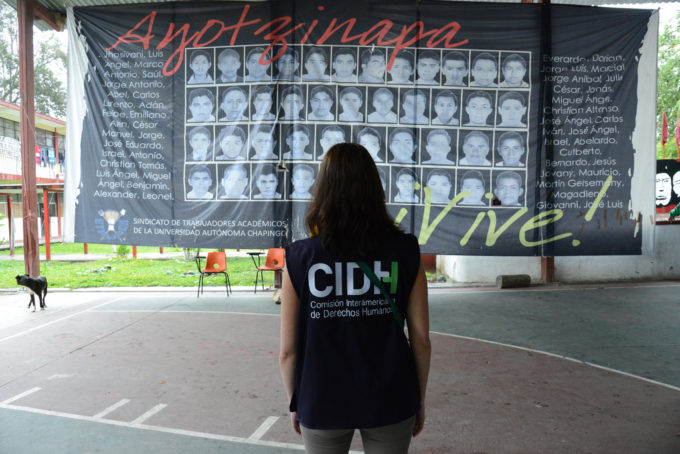
Como parte del ciclo Los derechos humanos en tiempos de odio fueron presentados en la FLACSO México los resultados de una investigación sobre la relación entre la institucionalización de los derechos humanos y su ejercicio efectivo en algunos países de América Latina.
Este trabajo es una continuación del libro Entre el pesimismo y la esperanza: Los derechos humanos en América Latina. Metodología para su estudio y medición, un ambicioso esfuerzo de la FLACSO México para establecer en la región las relaciones entre las diferentes formas en que se ha institucionalizado la protección de los derechos humanos con la economía, la democracia y el efectivo ejercicio de estos derechos.
Este nuevo estudio parte de la hipótesis según la cual entre más institucionalización de los derechos humanos hay un mayor disfrute. La investigación, realizada en Ecuador, Uruguay y México, dio resultados contrarios. Mejor: atípicos, como lo demostraron Luis Daniel Vázquez, Karina Ansolabehere y Francisco Valdés Ugalde, investigadores de la Facultad.
Luis Daniel Vázquez presentó el caso ecuatoriano, en el que hay una alta institucionalización de los derechos humanos pero poco disfrute por la población. Para Vázquez esto puede deberse a que Ecuador ha pasado recientemente por largos procesos de inestabilidad política y una crisis económica muy profunda.
Y es que, explicó el especialista, “sin democratización y sin una economía sana no puede haber un ejercicio sano de los derechos humanos”. Si bien Ecuador es un ejemplo de incorporación de los derechos fundamentales a las leyes e instituciones, ha quedado aletargado en su implementación.
En sentido contrario se presenta el caso de Uruguay, país en el que existe un alto disfrute de los derechos y poca y tardía institucionalización. En ese país los derechos humanos están cimentados en dos pilares: instituciones de bienestar muy fuertes y un sólido Estado de Derecho concebido en sentido tradicional, argumentó la especialista Karina Ansolabehere.
“Uruguay tiene un piso fértil en materia democrática. Cuenta además con un movimiento sindical independiente y de izquierda que ha sido un actor fundamental en la demanda de derechos humanos. En materia económica, ha habido una evolución del salario mínimo y una mejora en el salario medio, además de una baja en los precios de los alimentos”.
Para Ansolabehere, Uruguay es un caso paradigmático, porque ha compatibilizado la tradición de igualdad distributiva con las nuevas demandas para el reconocimiento de la igualdad en otros planos en materia de género, niñez y juventud.
México, “el país donde todo es a medias”
El investigador y director de la FLACSO México, Francisco Valdés Ugalde presentó los hallazgos para el caso mexicano: una institucionalización intermedia y un goce medio de los derechos humanos.
Valdés Ugalde explicó que a partir de los noventa hubo fuertes avances normativos que culminaron con la reforma del 2011 y con movilizaciones sociales, de recursos políticos y de políticas públicas en dirección a una mayor protección de los derechos.
Sin embargo “una cosa es lo que se dice y otra lo que se hace”, puntualizó Valdés. Para él la explicación podría encontrarse en que “la cultura política mexicana está atada a las viejas estructuras funcionales del sistema hegemónico” en la que es típico pugnar por tener una constitución ejemplar pero que no puede llevarse a la práctica.
El especialista en Estado de Derecho y cultura de la legalidad señaló, además, que existe una inercia y resistencia por parte del Estado para liberar al poder judicial, resistencia que nace incluso en el propio poder judicial por estar muy arraigado a viejas tradiciones.
Una baja democratización y una economía poco consolidada, aunado a esta reincidencia generalizada en las malas prácticas hegemónicas son un terreno poco fértil para la institucionalización y el ejercicio de los derechos humanos en México: “es como sembrar maíz en el desierto”, apuntó Valdés.
Los mexicanos, ahondó, no saben a dónde acudir para recibir asesoría judicial de calidad, predomina entre los ciudadanos el “más vale un mal arreglo que un buen pleito” porque acudir al sistema de justicia genera desconfianza y significa que el más débil va a perder.
Para concluir con un ejemplo claro, el director de la FLACSO México presentó una pirámide invertida en la que se observa que en México entre 2006 y 2014 hay 23 mil personas desaparecidas, 291 casos en manos de la justicia y tan sólo seis sentencias emitidas. “Esto nos da cuenta en un caso específico que la falta de acción del Estado mexicano es claramente patente”.
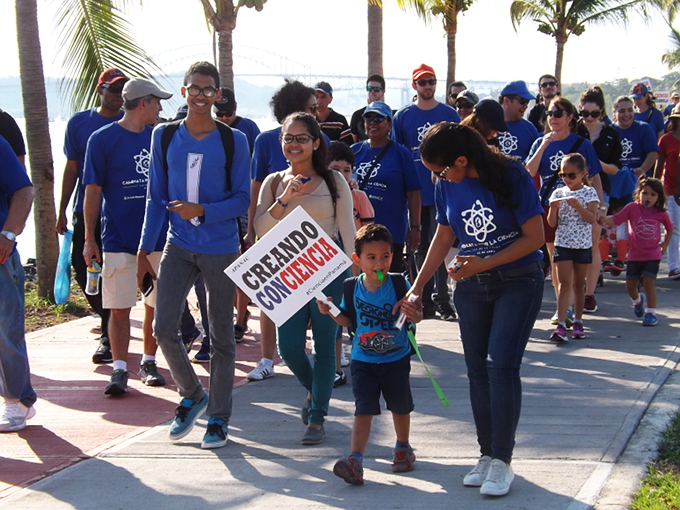
On Saturday, April 22 — Earth Day — some 300 or more people gathered first in smaller numbers for a day of activities at Panama City’s iconic BioMuseo and then for a march along the Amador Causeway to Punta Culebra. Such was the Panama version of the worldwide March for Science.
The march began as a movement in the United States, in reaction to the election of an anti-scientific president and congress by and large by people who believe that “alternative facts” convenient to them but which they are unable to prove are as true as those propositions for which there is solid, even in some cases incontrovertible, evidence. Among the powerful but unscientific beliefs the provoking the protest are notions of an inherent racial pecking order of superiority and inferiority, evolution as an elaborate anti-religious hoax, and above all that there is no climate change or if there is human activity has nothing to do with it. Here in Panama the scientific staff of the Smithsonian Tropical Research Institute (STRI), formally an autonomous US government entity, is indirectly but nevertheless really vulnerable to those sorts of politics. However, there are Panamanians who work in science and many public controversies here involve science or its negation, so there is a local panoply of issues, which mobilized a mostly Panamanian (even if very international) crowd to the event.
Panama does have physicians, teachers, cartographers, entomologists, vaccine researchers, environmental sleuths, computer scientists, meteorologists, ichthyologists and hydrologists among those who are trying to bring science to bear on public policies. At the moment the hot-button issue here is whether there should be sex education in the schools. But that, like most of the other controversies on the isthmus and in the USA tend to involve the assertions of those who believe that in public policy decisions their personal economic interests or their personal religious beliefs should count more than what can be shown by evidence.
There were a bunch of Smithsonian people present, but there was no formal contingent from the institution. The politics are and always have been dicey for a branch of the US government with an international staff operating in the sovereign Republic of Panama. This particular Panamanian administration was sympathetic enough to the cause to sponsor various Earth Day observances and have the Ministry of Environment, the Gorgas Memorial Institute and SENACYT participating in the March for Science activities. But there is a lot of anti-foreigner agitation by scandal-plagued politicians looking to distract public attention from their own sordid records en route to hoped-for reelection, and it can’t be automatically ruled out that on this date three years from now eminent scientists from all over the world will be denied visas to work at STRI on the theory that those jobs ought to be reserved for Panamanians. Panamanian government workers were there, but there were any Panamanian politicians working the crowd.
There were people from a number of environmental, social or political organizations or movements present, but most in their personal capacities. An exception to this trend was Panama’s chapter of the international Climate Change Lobby, which seeks to slow climate change by imposing fees for carbon emissions that cause people and institutions to change their behavior.
Did it change anybody’s mind? There were no counter-demonstrators, nor hostile reactions from people driving by. A number of drivers did signal their sympathy with their voices or their horns. But Panama is on the whole poorly educated and this makes it a daunting task to deliver the word to the four million or so people who were not there.
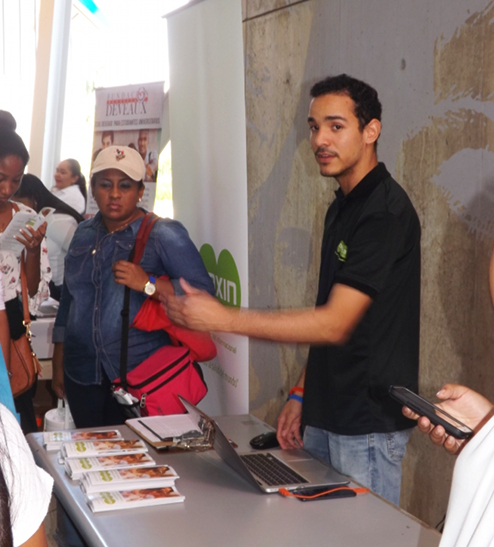
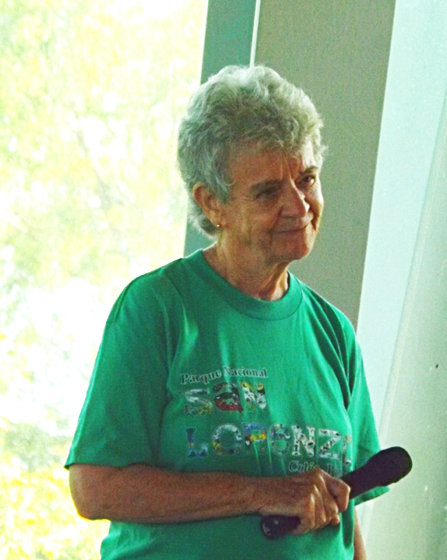
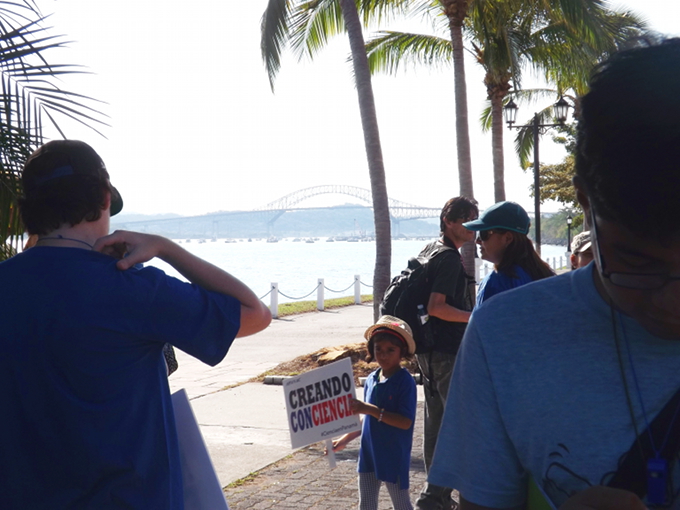
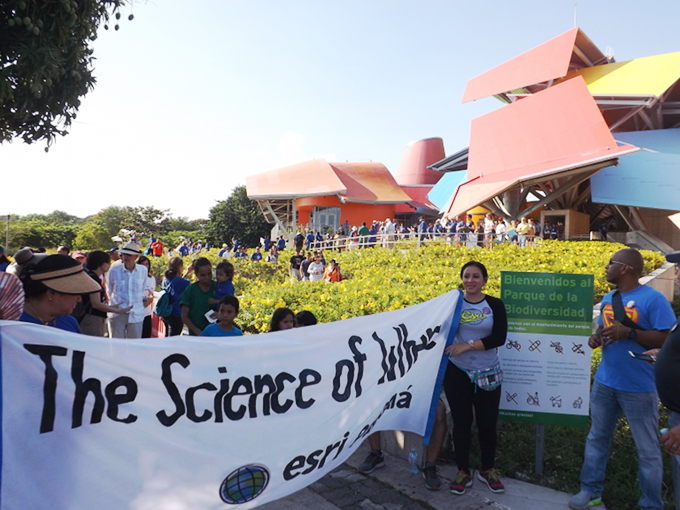
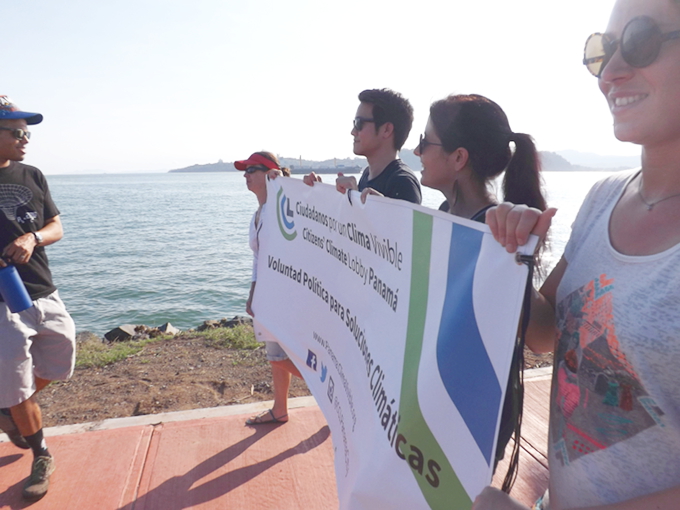
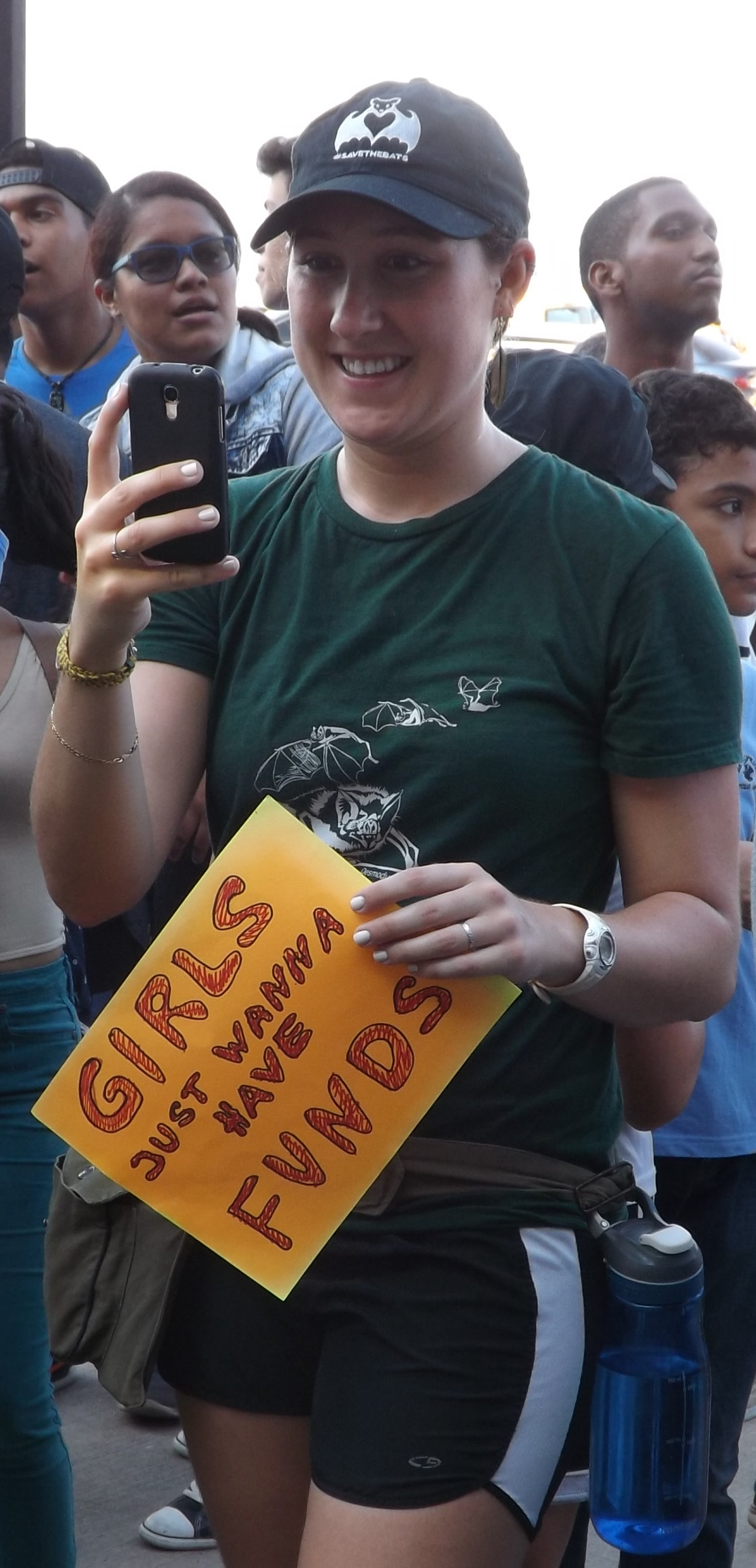
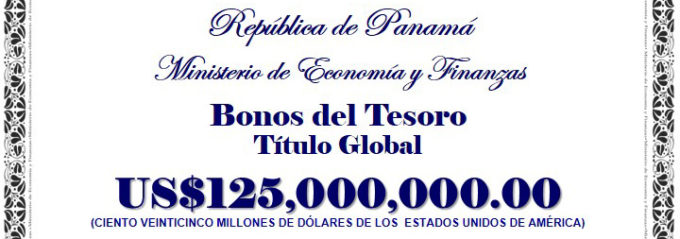
Amidst the daily whirlpool of corruption scandals that characterize our governing ineptocracy, and while the local bribe givers and takers of Odebrecht go unpunished, the public debt grows merrily and unabashedly.
The cosmetic government information nevertheless leaves it known that “the public debt grew $4.296 billion in 33 months.” That is, “during the Juan Carlos Varela administration the foreign debt grew $3.872 billion (29.3 percent) while the internal debt went up $452.3 million (10.3 percent).”
Recall that the public debt is divided into internal and external. The internal debt is the one that the state owes to creditors within the country and the external public debt is the one that must be paid abroad. Running up the public debt has been a permanent practice of the governments that we have had since 1968.
“The public debt is the obligation generated against the state by reason of the acquisition by it of goods or services on credit or of the pre-payments it has received from individuals, foreign governments, suppliers, international banks and multilateral entities: the World Bank, the International Monetary Fund (IMF), the Inter-American Development Bank (IDB), the Andean Development Corporation (CAF), the Eximbank and others. “
Panama is, day by day, an ultra-indebted country. In June of 2014 Panama’s foreign debt was $17.668 billion. In March of this year it went up to $21.964 billion. Meanwhile the internal public debt is $4.856 billion. That adds up to a net public debt of $26.820 billion, without counting other financial liabilities.
The Panamanian people shoulder this serious burden as the result of the political irresponsibility of successive governments, which are also responsible for the immense social debt of which we know.
If we do not quickly find mechanisms of citizen control over these debt policies of the political party system and its agents, we will not escape unstoppable social violence.
 Nanna Bryndis Hilmarsdottir of Of Monsters and Men
Nanna Bryndis Hilmarsdottir of Of Monsters and Men